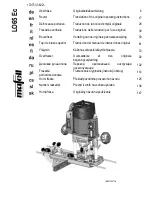
1-13
Cisco 12010, Cisco 12410, and Cisco 12810 Router Installation and Configuration Guide
OL-11496-01
Chapter 1 Cisco 12010, Cisco 12410, and Cisco 12810 Series Router Overview
Line Card and Route Processor Overview
Line Cards
Ports and connectors on the line card front panels provide interfaces for external
connections. Line cards communicate with the RP and exchange packet data with
each other through the switch fabric cards.
Caution
Any unoccupied card slot in the line card and RP card cage must have a blank
filler panel installed to meet electromagnetic compatibility (EMC) requirements
and to ensure proper air flow through the chassis. Also, if the front panel of a line
card does not completely fill the card slot opening, a narrow card filler panel must
be installed to meet the EMC requirements.
A cable management bracket on the front panel of each line card helps to organize
the interface cables connected to that line card.
Note
The Cisco 12000 series of routers support online insertion and removal (OIR),
allowing you to remove and replace a card while the router remains powered on.
Route Processor Selection
Two types of RPs are available: a Gigabit Route Processor (GRP) or a
Performance Route Processor (PRP). The GRP is the route processor that shipped
with earlier Cisco 12000 series routers; the PRP is the route processor shipping
with all current Cisco 12000 series routers. You cannot mix GRPs with PRPs. If
you install a redundant RP, it must be the same type as the primary RP.
Note
This publication uses the term route processor (RP) to indicate either a Gigabit
Route Processor (GRP) or a Performance Route Processor (PRP) unless otherwise
specified.
Summary of Contents for 12010 series
Page 6: ......
















































